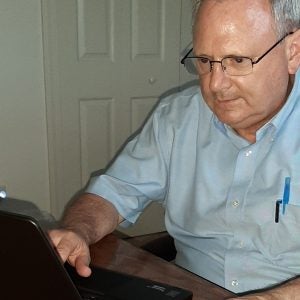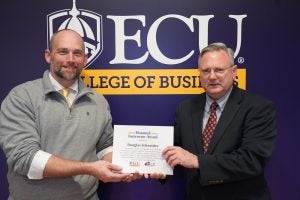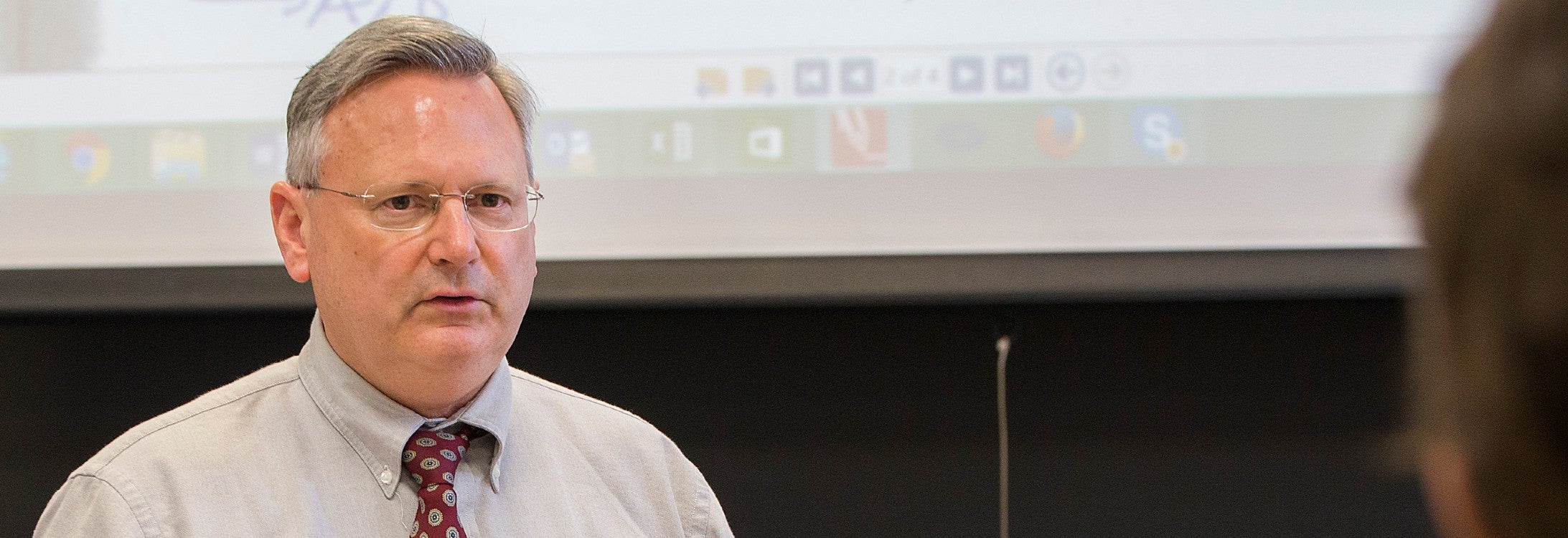August 26, 2020
Dr. Doug Schneider: past, present and future
If you want to know anything about the past 30 years in the Department of Accounting, ask Dr. Doug Schneider. Thanks to then-chair Dr. Larry Hagler, Schneider joined the department in 1991. He was promoted to associate professor in 1997, became a full professor in 2003, and in 2015, he was named to the Edwin B. Jones Family Endowed Professorship in Accounting.
Schneider has seen numerous chairs and deans during his tenure. He has served alongside accounting stalwarts such as Drs. Mark McCarthy, Dan Schisler, Rick Niswander, Cal Christian and John Reisch since the 1990s.
“We tried to install at ECU (and the College of Business) some of the positive things we experienced at our alma maters,” said Schneider. “Subsequent faculty have sought to do the same thing.”

Casey Siega-Riz with The Select Group presents the ECU Impact Faculty award to Dr. Doug Schneider (photo taken pre COVID)
Current associate dean and former accounting chair John Reisch recently referred to Schneider as the patriarch of the accounting department. “I believe that nearly every student who has come through the accounting department since 1991 has had to go through Doug,” said Reisch.
“I am not sure that every accounting major has taken a course from me during my time here, but most probably did,” said Schneider. “I also have known students by serving for 25 consecutive years as a faculty advisor for Beta Alpha Psi, the national honor society for accounting majors, and serving 28 years as treasurer and faculty advisor for sorority Alpha Delta Pi.”
It is estimated that more than 4,000 undergraduate and graduate students have been in Dr. Schneider’s classes since 1991.
Several former students of Schneider’s are now accounting faculty, including Drs. Linda Quick, Zhan Furner, and teaching instructors Rachel Brassine, Kim Everett Mallard and Azita Movahead.
“The accounting faculty who are not former students of mine are also dedicated professionals and great colleagues,” said Schneider. “I have always regarded all the faculty in the department and the College as valued colleagues.”
Those who know the accounting department know that Schneider is a dedicated faculty member at the College of Business. The world found this out three years ago when Schneider’s late-night Joyner Library visit to help students was documented on Twitter. The tweet published by then student Marrisa Flood, along with a photo of Schneider stamped 11:10 p.m., read, “When UR confused and email UR professor and he comes to the lib to help you study AWWW.”
The tweet went viral and got the attention of ABC news.
“When I was in the BSBA program at ECU, he (Schneider) was well known for being committed to his students,” said Quick. “When I had the opportunity to come back to ECU as faculty, knowing that I would work with colleagues who are committed to the students was one of the most appealing things about the job. I was pleased, but not surprised, to see that he (Schneider) was just as committed to the students in class, outside of class, and through Beta Alpha Psi as he had been when I was a student.”
We recently spoke with Schneider about his time at the College of Business and how he is adapting from a face-to-face approach to an online delivery method. He reflected on his many years of teaching and working with student groups.
How would you describe your approach to teaching your students?
I always felt the students at ECU are deserving of my time and best effort. I always sought to see the students as individuals who came from different backgrounds and locations but  who were trying to improve their opportunities in life and pursue their career goals. I think of students from small towns who took a step forward by attending ECU. I remember the Veterans who attended college after having served their country. I recall the student athletes who represented ECU and the students who served as officers in our student organizations.
who were trying to improve their opportunities in life and pursue their career goals. I think of students from small towns who took a step forward by attending ECU. I remember the Veterans who attended college after having served their country. I recall the student athletes who represented ECU and the students who served as officers in our student organizations.
And I think about the students who worked many hours a week at part-time jobs trying to pay for school and those students who overcame obstacles to return to school later in life. Our students came from Greenville and cities like Raleigh and Charlotte. Many students came from other states such as Virginia, Maryland, New Jersey, New York and the New England area. Our international students have traveled great distances, both geographically and culturally, to add to our campus.
I tried to see the students as individual people and not just numbers in a class.
How’s this term going?
Since I am teaching a graduate course during the first eight-week block, the class is meeting as a hybrid class, mostly in-person and partially online. The students prefer the in-person aspect of the class. For the online component, I have done my best to produce quality lecture videos that present the course material as close to as it would be presented inperson. In the second eight-week block I will be teaching an undergraduate accounting course that will be all online. So, the material will be presented by lecture videos I produced. I also will communicate with the students by email and perhaps a few virtual meetings. Expressing genuine interest in the students, even if virtually, is important.
Your secret of success came out a couple of years ago when your late-night library visit to help students went viral. How important has that approach been to how you teach future leaders?
It was a totally unexpected experience to be mentioned in the national media in the fall of 2017. I had been working late in the office as I frequently do, and some students studying together emailed me to ask a question. I responded that if they were in Joyner Library, it would be easier for me to walk over and answer their question than trying to type up a long email response. So I was trying to respond in a convenient manner, though it seemed to touch some people that I had been willing to help late at night. It was not a hardship for me to do so. I was surprised it generated the reaction that it did. I know other faculty have the same desire to help students, and perhaps they go about it more conventionally, or at least during different hours of the day. I hope, over the years, I provided some positive encouragement to our students, and perhaps they will also look for opportunities to help other people during their careers.
How can you emulate your in-person, dedicated approach in today’s online learning environment?

Dr. Doug Schneider, right, recognized for his contributions to student learning (photo taken pre COVID)
The approach I have taken is to prepare lecture videos that capture each page of the lecture packet I use to present the material in my courses. The video shows the page of the lecture packet being covered with my voice over discussing the material as I annotate the lecture notes with underlines and connecting key points with lines and arrows and solving exercises contained in the lecture notes. The video essentially shows what would be projected on the screen in a classroom, and my comments on the video are largely the same as what I would say in class. I also try to include in the videos the same brief illustrations from business news stories that I would present in class to convey the real-world relevance to the issues being covered.
How do you think today’s learning environment will impact the future of education delivery? Are we in a new norm?
Over the last six months across the country, faculty who had not previously been engaged in online teaching were suddenly doing so by necessity. This shift has generated an increase in the number of faculty with online teaching experience. It will likely lead to more online offerings by colleges and universities.
Is this environment conducive to teaching accounting at both the undergraduate and graduate levels?
The faculty and the students have adapted remarkably well to the transition to either online or hybrid classes. It seems that graduate students as a group manage online delivery somewhat better than undergraduates. However, I have heard from some undergraduates who find online courses agreeable to them.
What are your hopes for the accounting department moving forward?
I hope and expect that in 10 to 20 years, we are still committed to quality instruction and producing accounting research to keep our name recognized in academic accounting and the accounting profession. Also, it is my wish that the accounting faculty will maintain its high level of service to student organizations, to the department, the College of Business, ECU, the accounting profession and the larger community. It would be wonderful to see more former students who have earned doctoral degrees to return to their alma mater and become accounting faculty at ECU.
- Categories:
- Accounting


